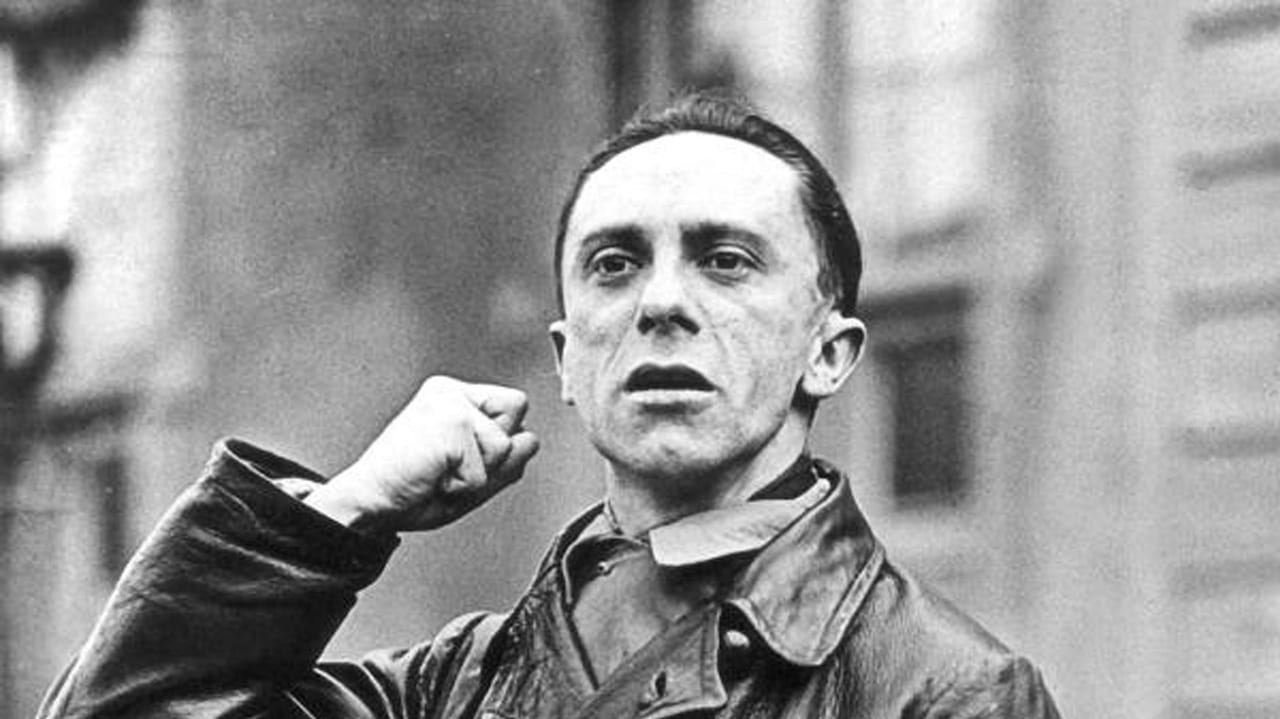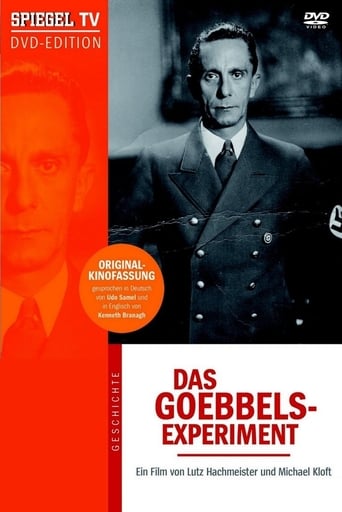Hellen
I like the storyline of this show,it attract me so much
CrawlerChunky
In truth, there is barely enough story here to make a film.
Fairaher
The film makes a home in your brain and the only cure is to see it again.
Stephan Hammond
It is an exhilarating, distressing, funny and profound film, with one of the more memorable film scores in years,
Horst in Translation (filmreviews@web.de)
"Das Goebbels-Experiment" or "The Goebbels Experiment" is a collaboration between Germany and Great Britain and this film was made back in 2005, so it had its 10th anniversary last year. This exists with English and German narration and depending which version you watch, you will hear either Kenneth Branagh or Udo Samel. The writer and director is Lutz Hachmeister and these 105 minutes are probably his most known work to-date. The title already says what it is about, namely Joseph Goebbels, one of the big names inevitable linked to Nazi Germany as he was Hitler's most loyal aide and follower and he even went with him into death on his own will.The film and the narration I mentioned previously consists basically entirely of writing from Goebbels himself. This certainly makes a difference here as such proximity to the subject is something you don't get in every documentary movie. It is his words. We find out a whole lot about him, his relationships with politicians like Hitler and Göhring for example, but also for example about how he saw Leni Riefenstahl. There's also many personal parts in here, for example we get to know how he crushed on his future wife Magda immediately and I was a bit surprised his children weren't really part of these recordings or maybe they just weren't included, which is kinda sad looking at how many he had if they really meant so little to him.All in all, it was a pretty good effort I would say. I learned something I have not yet known on some occasions here and I think the films makes an impact and does not belong to the gray mass of Nazi-themed documentaries who basically all tell exactly the same. I would not say it is a must-see, but it is probably a good watch for everybody with an interest in German history of the 20th century. Also it dragged almost never, which is always a decent achievement for a film that runs for over 100 minutes. Thumbs-up from me. Go see it.
Michael O'Keefe
Maybe the second most important man in Germany's Nazi regime. Joseph Goebbels comes to life through the narration of actor Kenneth Branagh reading from the pages in the diary kept my Hitler's spin doctor. Goebbels was definitely a radical socialist that was emphatically in adoration of Hitler and everything he represented. Working as the chief of propaganda and carrying out the inner most thoughts of the Nazi leader, Goebbles would come to prove to be unscrupulously cruel, egotistical and masterful in his work for the Third Reich. He was proud to be the man behind Hitler. Using the diaries as a main source along with historical footage from German archives, this film is a very fine chronicle of Goebble's life even as he reinvented himself from the initial attraction to the Nazi party up to his suicide near the end of World War II. Kudos to filmmakers Lutz Hachmeister and Michael Kloft for their dedication to this project.
groggo
Writers-directors Lutz Hachmeister and Michael Kloft structured this documentary in an unusual way by offering the actual words from Joseph Goebbels's 1924-1945 diaries. Goebbels's word are spoken by the gifted British actor-director Kenneth Branagh, who unfortunately reads them as if he were just passing through town and needed a few extra bucks. Goebbels was a man of mercurial emotion, but that's hard to pick up from Branagh's rapid-fire and seemingly diffident delivery.The film's structure leads to bigger problems: there are too many glaring omissions of crucial events in world history. A second narrator should have been used to fill in these gaps.The examples of omission are numerous. We get a mere passing glance at the invasion of Poland, the event that was singularly responsible for launching World War II in Europe. We barely see the violent roundup of Jews all over the country, although Goebbels wrote often about his hatred of the 'Juden'. The Battle of Britain, a critical early turning point in the war that is often credited with dissuading Hitler from invading England, is not even mentioned. The war on the eastern front with Russia is barely examined, we hear only scant mention of D-Day, there is no reference to the famous attempt on Hitler's life, and the film abruptly ends in less than five minutes with the pristine bodies of Goebbels's children and his own charred corpse.The film does work as an examination of Goebbels's exasperation and frustrated self-importance (he saw himself as a possible Fuhrer). His smugness and arrogance are noted throughout in his diaries. He imagines himself as a 'new' Dostoyevsky, he deems the brilliant cinematographer-propagandist Leni Reifenstahl as an irritating 'minor' talent, he scoffs at Goering, Himmler and others, and he fairly glows when Der Adolph pats him on the back.Joseph Goebbels and his 'philosophy' of propaganda (repeat lies often enough and they will eventually be interpreted by the public as truth) are alive and well in our society. Goebbels may be dead, but his ideas, in different forms, live on.
kallen99
This is a very interesting and surprisingly engaging film. Branagh reads excerpts from Goebbels' diary or translations of speeches while the film shows newsreel footage, scenes from propaganda films, and bits from theatrical movies. Sometimes the visual footage illustrates Goebbels's words; sometimes it provides an ironic juxtaposition. I have one important reservation. There is no real attempt to include even coverage of events during the period. Quite a few subjects are simply not mentioned. For example, there is no discussion of the German's defeat at Stalingrad, which must have been a gigantic problem for Goebbels as Propaganda Minister. Even more striking, there is very little discussion of Nazi treatment of the Jews. The film includes some early anti-Semitic quotations and a little footage of Kristallnacht, but nothing that I can recall about the Holocaust itself. Perhaps Goebbels' diaries don't include entries about these subjects, but the omission is striking.

